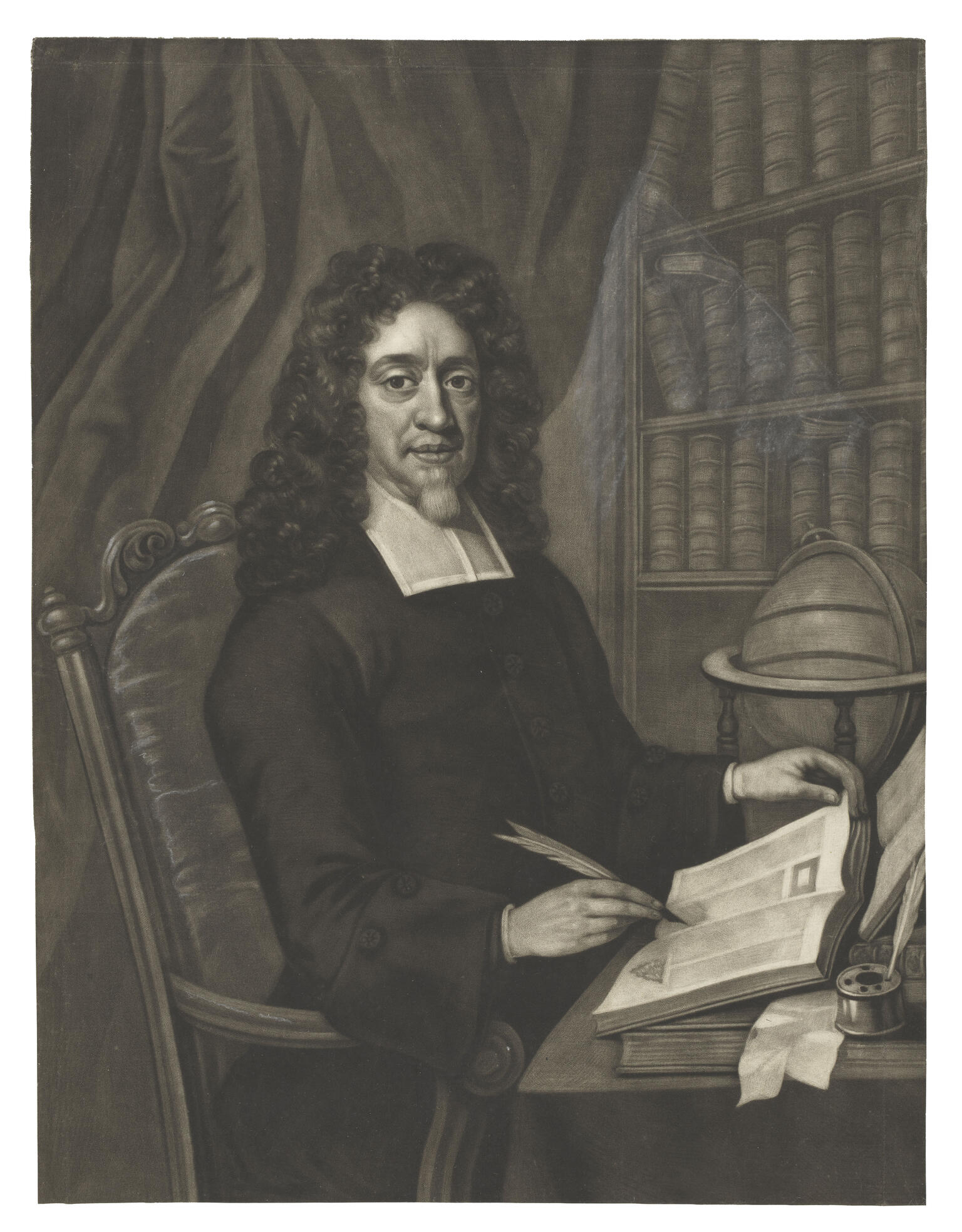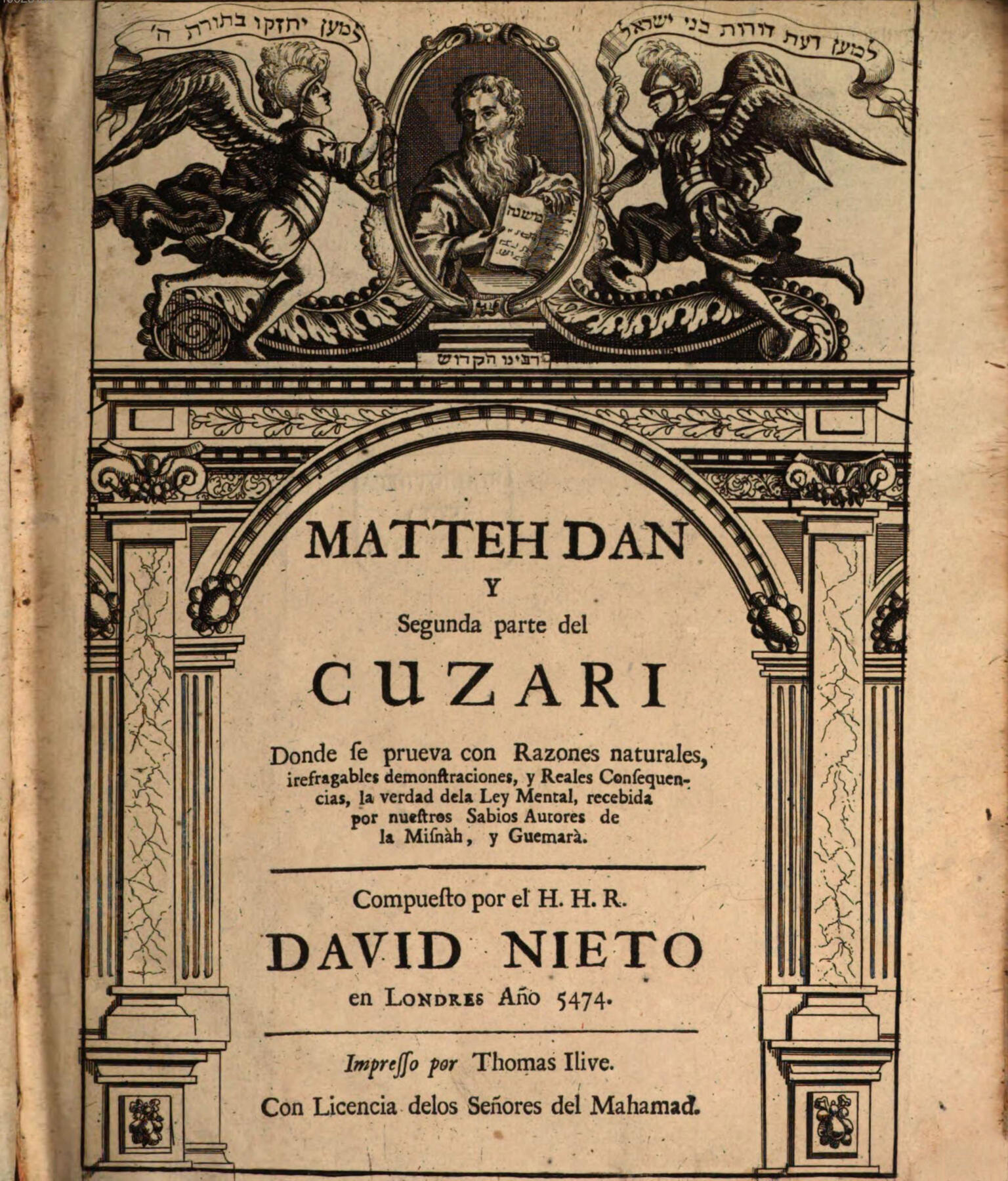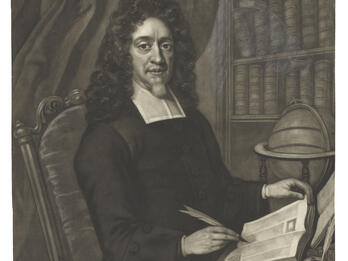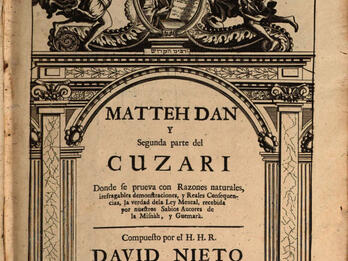Mateh Dan (The Tribe of Dan)
My friends desired me to record the discussions I have had with those who reject the authority of the Oral Law; and, in compliance with their desire, I have gathered all that I found bearing on that subject in the conversations of the second Haver with the King Kuzar, which occurred in the year of the creation 5470.
I shall first relate the manner in which those conversations originated. The Haver, intending to make a tour in the east, embarked from his native town, Venice. On the tenth day of the voyage, a violent storm arose, and, by stress of weather, he was forced to land on the territory of King Kuzar. There the people received him with marks of great friendship and honour; and when the king was informed that a Hebrew savant was arrived, he immediately sent for him. When presented to his majesty, he respectfully saluted him by bowing thrice, saying, “May my lord the king live for ever!”—whereupon, his majesty rose from his throne, and embraced him with great affection. And thus did his majesty reply:—
“May peace attend thy visit! Welcome art thou, blessed of the Lord! Praise be to the Most High, in whom I put my trust; for he has heard my prayer from his holy place! Since my understanding has been made sound, I have wept so that my couch has been moistened with tears, I have poured out my soul before the Almighty in fervent prayers, and I have fasted and clothed myself with sackcloth, thinking to move the Almighty in behalf of my nation; fearing they might fall a prey to the practices of the Karaites, who are endeavouring to seduce them from the inheritance of God—the Oral Law. Six hundred years since the Almighty, before whom my ancestors walked uprightly, sent his servant. Rabbi Judah Halevi (blessed be his name), to rescue our souls from the snares of the idolaters; and, from that time, none of us have withdrawn from the true worship. That learned and holy man showed us, in his elaborate work, named as myself, Kuzari, that the Almighty is bountiful to all who call upon Him with sincerity. As an evidence of its great merit authors say, ‘All the words of Rabbi Judah Halevi are truth’; and, when they wish to caution the reader not to wander from his words, ‘Beware thou dost not forsake the Levi.’ Nevertheless, all the discourse he had with my illustrious father, Joseph, referred only to the Scriptural Law; the Oral Law he touched upon but seldom, and then but slightly. Wherefore have I felt grief in my heart, as the Karaites now question the veracity of the traditions of our learned ancestors. They designate as evil that which is good; they turn light into darkness; bitter flavours are to their palates sweet; and thus they treat truth as falsehood. My wrath has by their folly been greatly excited; dejection has, in consequence, come sorely upon me, so that my nights have passed without repose. Much has my distress been increased by seeing that in my country the learned were, before them, as sheep in the presence of the shearers. They remained silent, because they were unable to answer, except in the words of that passage in Deuteronomy (17, 11)—‘According to the sentence of the law which they shall teach thee, and according to the judgement which they shall tell thee, thou shalt do’; and at this the Karaites smiled, for they interpret these words differently from what we do. My soul grew too large for its sphere; and so passionate became my desire for our sages to be justified, that I exclaimed to myself, ‘Oh! that I had wings fleet as those of a pigeon, to bear me round the world to some region where a learned Israelite may be found, who can demonstrate the truth of our Oral Law from the Scriptures themselves, as well as by the force of sound argument.’ Rabbi Immanuel Aboab wrote an admirable work on this subject, in Spanish, entitled Nomologia (Discourses on the Law); and all his words therein are just and true. Yet it is not sufficiently satisfactory, for it leaves two questions bearing on this important matter unanswered. These are,—
“1st. Whether it is possible to understand the Scriptural Law without the Oral Law?
“2nd. Whether the commentary of our sages is the same received by Moses on Mount Sinai?
“Now the sceptics do agree with us in some points involved in those questions; for they acknowledge, in reference to the first, the necessity of being guided by tradition in fixing on the part of the human body to be circumcised, because it is not pointed out in the Scriptural Law; but they differ from us on all the other points. They also agree with us as to the usefulness of tradition to determine whether the month spoken of in the Scriptures was a solar or lunar month, in reference to the second question; but they reject its authority as regards the measurement or size of the sukkah, the substance and shape of phylacteries, etc. Moreover, they admit, with us, the truth of the Oral Law as to the part of the body to be circumcised, and that there are thirty-nine kinds of labour prohibited on the Sabbath-day; but they disagree with us as to what kinds of labour are prohibited, and as to the interpretation of nearly all the other commandments; for they interpret according to the understanding each one possesses; each builds an altar for himself, and says, ‘Put faith in my exposition.’ Thus they divide themselves into a multiplicity of sects and parties, utterly neglecting to train their hearts to fear the Lord, Who sanctified us with his precepts, ordaining, ‘Ye shall have only one law.’ That my report of them is a correct one, listen to me now, and I will convince thee: A work, put forth by them, has come into my hands, the author of which is Elijah, the son of Moses, who confesses that there rose three disputes amongst them, at three different epochs. They referred to circumcision, if the eighth day happened to be on the Sabbath. The early Karaites did circumcise on that day, for they expounded the passage, ‘On the eighth day ye shall circumcise,’ as we do—‘on the eighth day,’ although the eighth might fall on a Sabbath (Shabbat 132a). The second generation after them, thinking that by circumcising they infringed the prohibitions of the Sabbath, therefore postponed the ceremony till after the Sabbath. The third generation deviated from the practice of their immediate progenitors, returning, however, in some measure, to the custom of the early Karaites; for they attached more importance to the circumcision on the eighth day, but decided on not circumcising till after sunset on the Sabbath, when twilight should set in, which they term the suburb, or latter portion of the Sabbath, because, in their opinion, that portion of the day is called the Sabbath only in reference to the name of the day; while, in reference to keeping the Sabbath, it is no longer considered as a time of rest. By this you may perceive they are not aware that these are two points so contradictory, as not to be at all applicable to one and the same subject.”
Translated by
and
.
Credits
David Nieto, from Maṭeh Dan: The Rod of Judgement, vol. 2, trans. Louise Loewe and Raphael Loewe (Jerusalem and London: The Spanish and Portuguese Jews’ Congregation, 2008), pp. 12–15. Used with permission of The Society of Heshaim, the Spanish and Portuguese Jews’ Congregation, London.
Published in: The Posen Library of Jewish Culture and Civilization, vol. 5.








